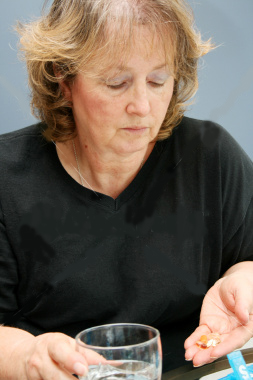Taking Medications
A Healthy Hearts Guide  ® ®
|

|
-
All medication must be taken correctly in order to control your ailment. Medicines taken incorrectly can be harmful.
-
Ask your doctor how long you will need to take medicine and what is the purpose of the medicine.
-
Follow the guidelines below for taking medicines more safely.
|
Organize your pills
Some people find it helpful to use a pill organizer, especially if taking several
different kinds of pills at different times of the day. A quick glance at an organizer
will tell you if you have remembered to take your medicines for that day. Organizers are
available at most drug stores and are available without a prescription.
Keep a Medication Record
Write your name and any allergies at the top. Then list all the medicines and supplements you are currently taking. Include the name
of the medicine- both the generic and brand names, times you are to take it and the purpose. Ask
your practitioner how long you will need to take the medicine (see sample list below.) Click
here to download a Medication Record form.
Keep your Medication Record updated and keep it with you. Take it to every doctor appointment. It could save your life!
|
Name of Medicine and
directions for use
|
Times to take
|
Purpose |
|
Morn |
Noon |
Eve |
Bed |
|
Aspirin 325 mg. 1 tablet daily
(other name: Ecotrin)
|
8 AM |
|
|
|
Prevent heart attack/Treat
fever/Lessen pain |
Digoxin 0.125 mg. 1 tablet daily
(other name: Lanoxin)
|
8 AM |
|
|
|
Slows & strengthens heartbeat |
Avoid potentially harmful drug interactions
- Let all of your prescribing practitioners and pharmacists know about
every medicine you are taking including
over-the counter medicines, vitamins, supplements, herbals and birth control pills.
- If possible, purchase all of your medicines from one pharmacy.
- Don’t share medicines with friends or family.
- Heed warning labels on bottles.
- Discard outdated medicines.
- Store medicines in their original containers, in a cool, dry place and out of reach of
children and pets.
- Do not mix different pills in one bottle.
- Find out what you should do if you develop side
effects..
Double check your medicines when...
- Picking up a new or refilled prescription. Are the pills a different color or
shape? A generic pill may look very different from a brand-name pill. Check the milligram
("mg.") dose. Is it the same as the one you were taking before? Are you to take
the same number of pills each day? If you have any ques tions, call your pharmacist or
doctor.
- In a hospital or nursing home. First, make sure the nurse checks
your ID bracelet. If you don’t recognize the pills, ASK QUESTIONS. You should
understand what medicines have been prescribed for you and why you are taking them. If
not, ask to speak with your doctor.
- At time of hospital discharge or after a visit with your healthcare practitioner. Before leaving, make sure you have written instructions on how to take your medicines.
If you have any concerns, call your pharmacist.
Ask for a print-out sheet describing your medicine and what it
is for, along with any side-effects. Ask for both the generic and brand name to be
printed on the label. Ask for the label to list what the medicine is for. Just
Ask! Your pharmacist is there to help.
Note: Report any serious unexpected reactions to FDA’s Medwatch program at 1-800-332-1088.
Related links:
|
Facts
|
Shortcut to Healthy Hearts
|
Annual Physical
|
Blood Pressure
|
Blood Pressure Log
|
Blood Pressure Monitoring
|
Taking Medicines Safely
|
Medicines Record
|
Menopause
|
Caregiver Support
|
Care Plan
|
Child Development Checklist
|
Safety Checklist for
Infants and Toddlers
|
Improve Doctor–Patient Communication
|
Path for a Healthy Heart
|
Taking Coumadin
|
Get Smart About Smoking
|
How to Quit Smoking
|
Heart Wellness
Back to top
Disclaimer | Donate Now | Contact Us | Site Map | Store
|
©1999-2000; updates: 2002, 2004, 2005, 2007 Women's Heart Foundation, Inc. All rights reserved.
Unauthorized use prohibited. The information contained in this Women's
Heart Foundation (WHF) Web site is not a substitute for medical advice or
treatment, and WHF recommends consultation with your doctor or health care
professional.
|
|
|

























